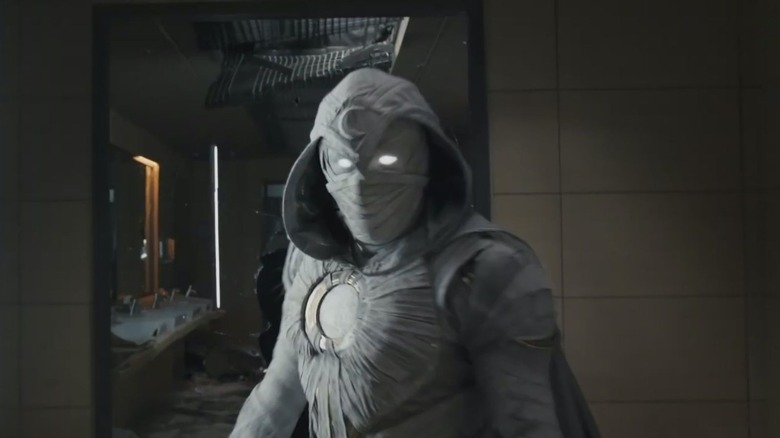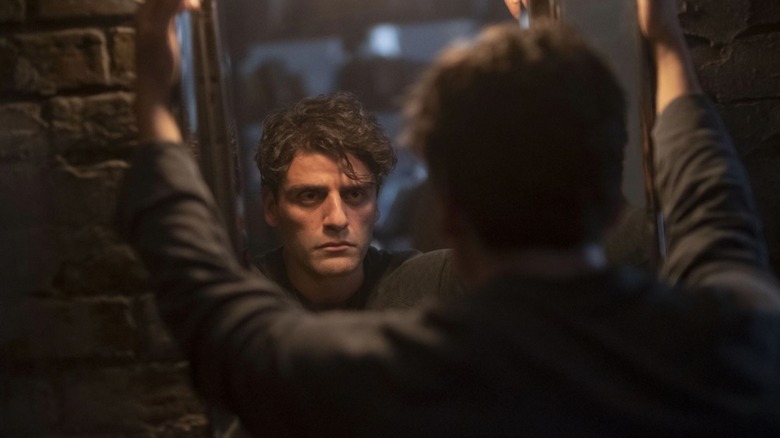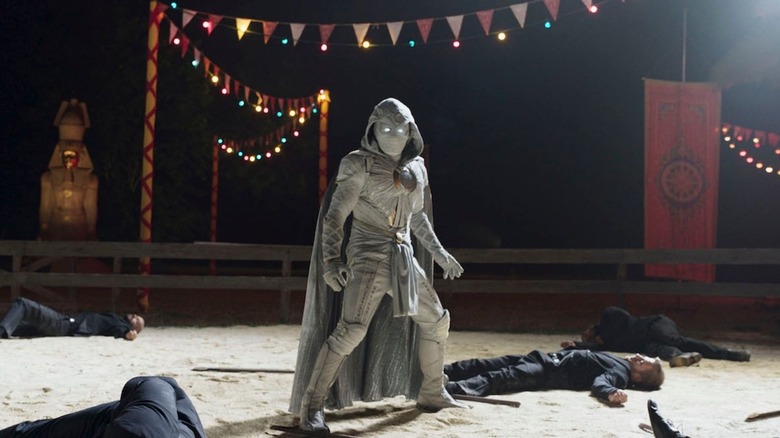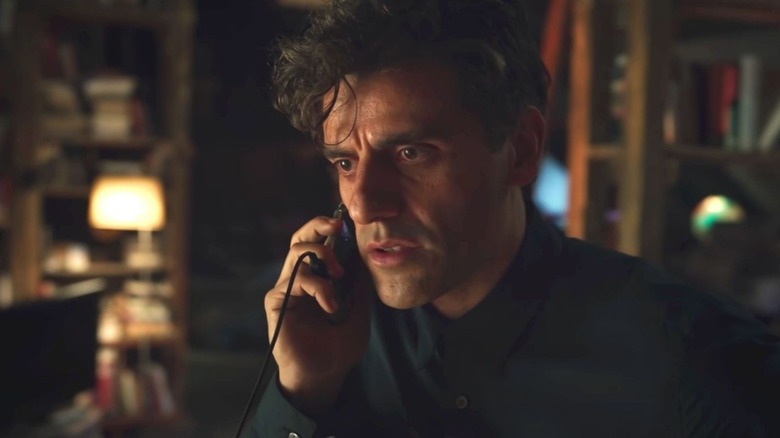Moon Knight's Steven Grant Is The Marvel Hero We Need Right Now
With "Moon Knight," Marvel Studios has finally introduced us to Steven Grant (Oscar Isaac), the MCU's most fascinating protagonist in a long time. He's not some braveheart trying to enlist himself in the army. Or a Norse god awaiting coronation. Steven is unlike any Marvel hero we've seen before. He's an employee at London's National Art Gallery — and despite having a magnitude of knowledge, works at the gift shop. He lives alone in his apartment and chains himself to the bed to stop himself from sleepwalking. He listens to an automated service to stay awake. He can't even go on a date. And regardless of the precaution he takes, Steven often finds himself in extremely violent situations.
And he's the Marvel hero we need right now.
Steven is disinterested in his superhero personality
"Moon Knight" feels like an undertaking in character study — and offers two very different, distinctive personalities of the same person; personalities that we learn about in real-time as the show goes on. We see how Steven is plagued by out-of-body experiences and struggles to distinguish the difference between reality and his dreams. We learn that he has dissociative identity disorder and is just one version of Marc Spector, a globe-trotting mercenary with a penchant for violence, a man we're yet to learn more about. Steven is an unreliable narrator who is discovering himself as the show goes on, and it's safe to say that while he is both spooked and intrigued by his findings, he's not on board with it.
Marc repeatedly takes over Grant's body and goes on his missions. When Grant gains control again, he knows he has lost time, but there's no discernible evidence to prove it. And when he learns more about Marc's identity — that he is an avatar (incarnation) of the Egyptian God of the moon and vengeance Khonshu (F. Murray Abraham) — he doesn't have his Eureka moment. Most MCU heroes accept their fate after having greatness thrust upon them or receiving an order from a higher power.
But not Steven.
He doesn't know what comes next
Anyone watching "Moon Knight" will quickly discover the MCU has done something different this time around. They've created a refreshing, and, let's face it, different take on a superhero. Steven couldn't care less about being superpowered. He doesn't have any sort of moment of self-realization, nor does he let destiny determine his fate. In fact, he fights against it. Steven is hopelessly out of his element, and he is indifferent to Marc's persona, whether mercenary or superhero, and doesn't stop hoping for it to be a fever dream.
It's refreshing to see a hero who feels so out of place he can't keep up with the action. Steven has a quirky accent. He is shy, and he fidgets out of nervousness. He detests Marc's violent nature. A blunt person (or trash-talking ancient Egyptian god) might even call him a loser. He's essentially a fly on the wall while Marc carries out his mercenary duties. He's never a part of the action — and neither are we, as camera transitions and cuts are weaved together to make it seem like we've experienced Steven's blackout with him. And in the uncertain times we live in today, it's exciting to see a hero who doesn't know what comes next, who is in the dark and just as confused as the rest of us. It's been such a long time since we met a Marvel hero at his wit's end.
A classic Marvel archetype not explored enough
While Steven Grant's inability to balance his real life and superhero persona is made worse by his dissociative identity disorder, it interestingly serves as a callback to the early Marvel superheroes who struggled to balance their real lives with their heroic responsibilities. For instance, Steven's inner battle is an incredible reminder of Bruce Banner/the Hulk, who never wanted to transform into a giant green monster. Grant's refusal to surrender to Marc's wishes — to let him take control — represents Banner's refusal to allow the Hulk to take over. But in both cases, they've lost control over their bodies and don't have a choice. It's hard for them to lead a normal life because both Steven and Banner fear being discovered — the former fears others discovering his mercenary, god-like identity, and the latter is afraid to unleash the monster within him in public.
In a way, Steven's struggle to balance his personal life with Marc's is also resonant of Spider-Man and Matt Murdock and the hardships they face while living a dual life. Their superhero alter-egos repeatedly endanger them, and they can never fuse the two personalities together — the two must always function individually. When the internal fight between Steven and Marc plays out, both personalities are trying to enforce authority over the other, and both are persistent enough not to let the other get a higher hand. This chaotic character is a significant departure from the otherwise optimistic and vibrant heroes that populate the larger part of the Marvel cinematic universe.
With "Moon Knight," Marvel Studios again proves that it doesn't need a character with star status (such as Thor or even Captain America) to capture our attention. Oscar Isaac's sincere portrayal of an oddball, tortured soul who can't keep up with the pace his chaotic life demands is fascinating enough. Isaac wonderfully depicts the inner turmoil within Steven and Marc and ensures it takes center stage. Moon Knight's deeply layered character allows Isaac to finally display every emotion made available to him by his acting range — which is satisfyingly delivered through Steven's humor, his unsought volatility, and his charming British accent.



